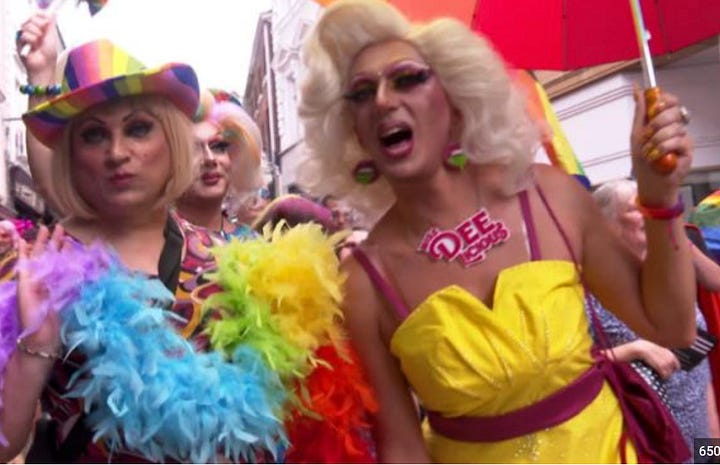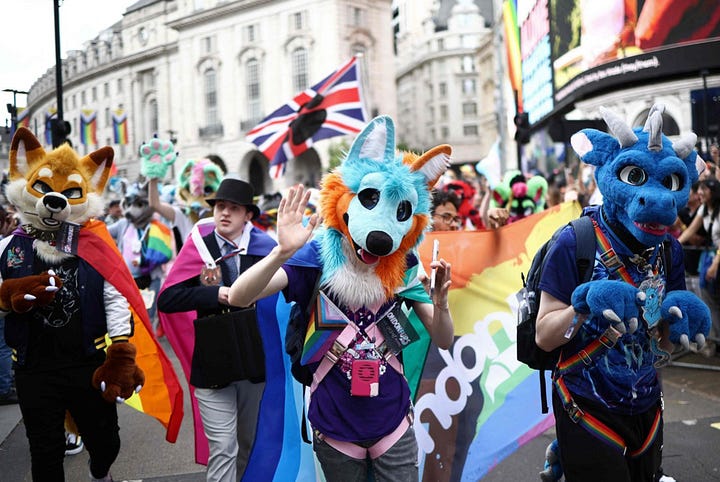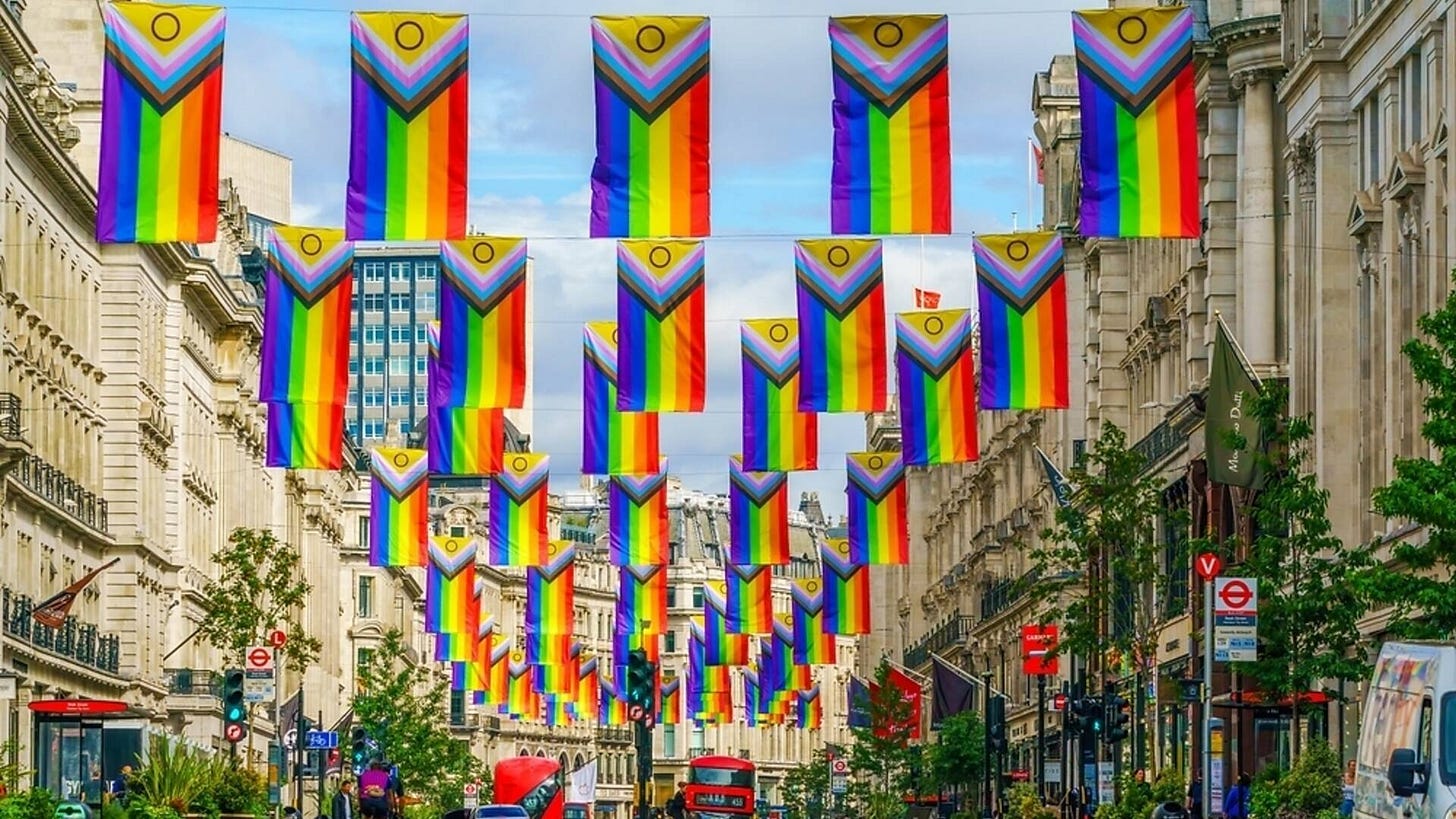Pride month has been and gone for another year, with its corporate sponsors and flags, its pronouns and genders, its rainbow-coloured sexualities, its furry friends and feathered fans.


I thought of going this year, partly out of curiosity, partly out of solidarity, but who would I go as? I looked at London Pride’s website to find my identity, and realized I could go in many guises:
We are proud to run the UK’s largest and most diverse Pride event, which provides a vital platform for all members of London's LGBT+ communities, including those who identify as lesbian, gay, bisexual, trans*, queer, questioning, intersex, non-binary, asexual, polysexual, genderqueer, and gender variant. Our aim is to raise awareness of LGBT+ issues and advocate for the freedoms that will enable everyone to live their lives on equal footing.
Awareness raising? Yes! Freedoms? Yes! Equality? Yes! I’m in! But I wonder where I can find these communities. Would I know how to recognize a community of questioning asexual gender variant people? Would they be running bingo nights, organising pub quizzes, helping out at the local food bank, collecting clothes for refugees, gathering together in book groups, prayer groups or knitting circles? Those things go on in the communities I’m part of, and they include gays and lesbians and trans* persons, not to mention those who are asexual and bisexual (though honestly, too much information folks), but that’s not what makes us a community. The communities I know in our postmodern, fragmented, diasporic localities are motley collections of people thrown together by chance or circumstance, making the most of living, working, and communing as neighbours and friends as best we can. But let’s set aside the community question, and look at identities.
Lesbian? I’ve been attracted to women—why not?—but I’ve had lots of desires for lots of bodies that I haven’t acted on, and some that I have. Gay? No, which also rules out trans. I’ve never felt like a man trapped in a woman’s body, let alone a gay man trapped in a woman’s body.
Bisexual? Well, back to those desirable bodies that come in many shapes, forms and genders. I remember Ali G talking about his Uncle Jamal who was tri-sexual. “He’ll try anything sexual.” I’m too inhibited for that, and I’m into the commitment that goes with love and marriage, but I’m glad that people today might be shrugging off the kind of prudish constraints that prevailed when I was growing up. Besides, imagination can take us where we might not boldly/bodily dare to go. I suspect many people have experienced bisexual desire without being into labels and identity politics. When gay and lesbian rights are protected, and when mutually consenting adults have the right to privacy with regard to what they do together sexually, is bisexuality really the hallmark of a marginalised and threatened community?
Besides, if sexuality is to do with erotic desire and not simply genital activity, then it overflows all boundaries. I’m re-reading Lady Chatterley’s Lover, and appreciating for the first time in these apocalyptic times how well Lawrence expresses the erotic abundance of nature in all its sensuality, over and against the dehumanising, desensitising impact of industrialisation and capitalism. (Yes, he goes over the top, but he could teach us a thing or two about the language of sex). Why reduce sexuality to bi- when it can be the boundless eros of life itself? And if people want to act on that in various permutations of polyamorous or bisexual couplings, then it’s up to them to negotiate that in the context of their commitments, lifestyles, and responsibilities.
Non-binary might be better, but that puts everybody else into binary boxes. I believe that there are only two sexes for the same reason that I believe we are experiencing a climate crisis and I believe that the earth is round. Sometimes, one has to trust the science, and there is no scientific justification for denying the binary sexual biology of the human mammal, nor the impact this has on our physical needs, laws, statistics, and sexual/reproductive differences. But we are creatures of language and imagination, and we can be creative with our gendered personae. We should all be non-binary if that means resisting dualistic sexual stereotypes which reduce the many ways of being human into two and only two genders conforming to two sexes, with all the imprisoning norms that go with such reductive identities. The sexual essentialism that makes gender and sex inseparable is a product of modernity. We can live without it, and many societies do and always have done. Gender is relational, cultural, plural, and often hierarchical in terms of subordinate feminine roles and authoritative masculine roles, but it bears no essential relationship to sexed bodies except in some forms of religious and trans ideology. The proliferation of definitions and identities around gender is not liberating. It is reductive, for it constrains our capacity for fluidity and ambiguity as an accepted reality of everyday life.
There comes a stage in life when maybe one feels the approach of that other label—asexual. But when was there ever a law against being asexual? When has anybody been persecuted for not wanting to have sex? Admittedly, in a society in which people are increasingly labelled, defined and categorised according to their sexuality, one might perhaps have to announce asexuality as a thing, but who cares, really?
As for identifying as intersex, I don’t have the differences in sex development (DSD) associated with intersex conditions, so that’s out. But the “I” is being quietly dropped anyway, as more and more intersex people resist being co-opted into this rainbow community of identity politics, this exuberant love-fest of sexually exotic higher beings.
How about polysexual, genderqueer, and gender variant? Could I maybe sign up to one of those? Probably not, but I do want to stand with the marginalised and the downtrodden. I want to be on the side of those who stand for freedom and equality. So I’m hoping somebody can tell me how to recognise a polysexual, genderqueer, gender variant victim, so that I can take his/her/their/its side when I witness oppression and prejudice. “Wot you lookin’ at, you polysexual gender variant perv?” “Oi, get outta here before I report you to the thought police.” Oh yes, that would be me. I’d be there like a knight to the rescue, because I am on the side of freedom and equality. I am an ally, and that means I am after all invited to the party, according to that London Pride website:
Our events are open to people of all races, faiths, abilities, sexualities, and genders, including straight and cis allies.
As a Guardian reader, I know that this wondrous community needs allies right now, for it is teetering on the margins and its friends are deserting it:
So yes, I’m an ally, which presumably means that I am not “lesbian, gay, bisexual, trans*, queer, questioning, intersex, non-binary, asexual, polysexual, genderqueer, [or] gender variant.” Ah, at last! I have found my label, which might be “none of the above” or, alternatively, “possibly some of the above, if only I knew what they all mean”.
I wonder if there’s room on that flag for another colour for people like me. I Googled it to see if I could identify myself, thinking maybe white would be my colour, because of its symbolic significance. After all, to be not only cis straight white or whatever but to agree with some of what gender-critical feminists and lesbians are saying requires a label, for one is by default a white supremacist, a demagogue of the Far Right, an enemy of the rainbow-coloured people. But oh, white has already been taken:
“Here comes everybody”, said James Joyce of the Catholic Church, but this is no angst-ridden congregation of believers burdened by sorrow and guilt, bearing their constipated sexuality into the confessional to be purged and punished week after week. No. These are beautiful people, joy incarnate, like Lady Jane and John Thomas, weaving bright summer flowers through their pubic hair and filling the world with healing, new ideas, prosperity (I get that one—they have achieved miracles of corporate sponsorship, even if Just Stop Oil put a bit of a dampener on things), serenity, spirit, a world in which all are welcome (even cis and straight allies, so long as they know their place and accept the pronouns and adjectives assigned to them).
Silly me. I thought Pride was about gay and lesbian rights, inspired by the Stonewall uprising. I thought it was about defending, supporting and affirming people who still in so many ways and in so many families, communities and cultures bear the full weight of society’s condemnation for desiring and loving those of the same sex. But no, it’s a New Age Love Fest, and why not?
Maybe it’s time to rebrand Pride as a carnival, for God knows we could do with a few more carnivals in these dreary times. It would fill the gap that was left when Britain decided to ditch all that carnivalesque religiosity and fill the pews with cis white men and women fretting until kingdom come over whether or not Jesus would let gays get married. The problem is, he didn’t have much to say about that, though he had plenty to say about welcoming strangers, feeding the hungry, clothing the naked, visiting the prisoners, all those other minor issues we can attend to once we’ve sorted out this sex thing.
So let’s have a carnival. Here comes (nearly) everybody. And when the rainbow fades and the storm clouds gather, please don’t anybody sing, “I think it’s going to rain today”.
Next time: All the world is queer save thee and me.
Please visit my other Substack site, for posts relating to my current research and reading.







